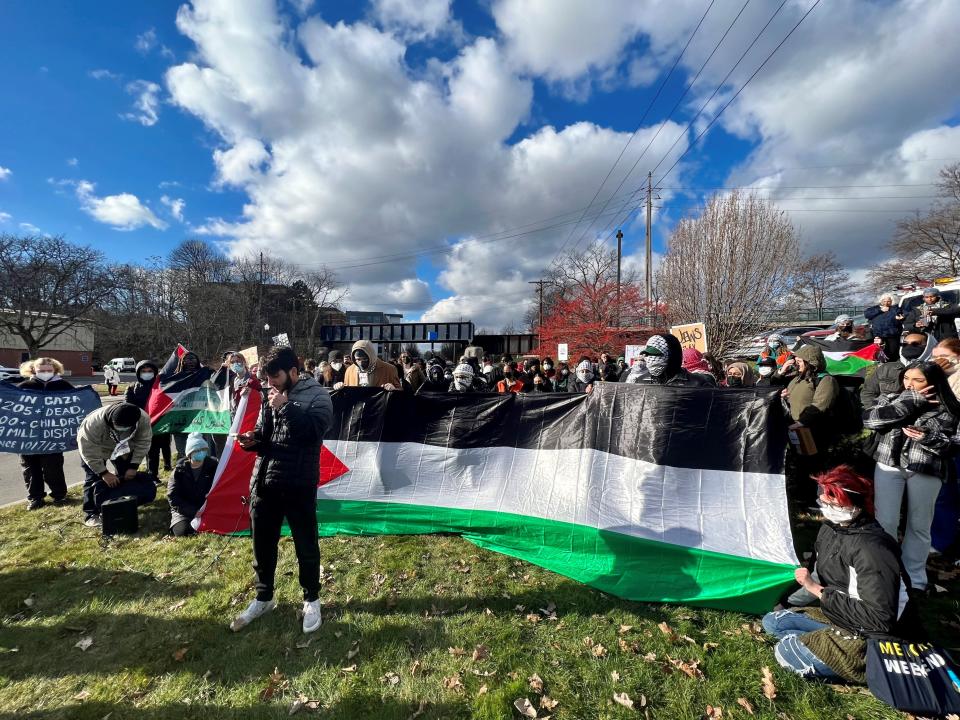Rochester universities put rules on protests. Is it censorship?
What really happened recently at an RIT protest advocating for Gaza residents?
Student activists at Rochester Institute of Technology claim the university agreed to let them use a parking lot to organize a carpool effort to an off-campus pro-Palestine rally last month ― and then sent undercover officers to keep tabs on them while they waited for their rides.
A student at Monroe Community College said administrators at her school approved an event to raise awareness about the Israel-Hamas war, but urged her not to include a liberation chant at the gathering, arguing it could incite violence.
And students at Nazareth University said their attempts to vocalize their support of people living and dying in Gaza during the war have been written off as anti-Semitic by some university staff.

What is the latest with the Gaza conflict?
The latest round of fighting in a decades-long conflict over Gaza started after the terror group Hamas attacked Israel, taking hostages and killing hundreds, on Oct. 7. In response, Israel launched a bombing campaign in Gaza that has killed thousands of Palestinians over the last two months.
As 2024 closes, the fighting continues, with Israel's prime minister promising to push ahead.
While the Israel-Hamas war intensifies overseas, a second battle is brewing at home. Local college students say their efforts to call for a ceasefire have been choked out by university censorship. University officials say they support the rights of students to organize, but rules must be in place to maintain order on their campuses.
UR student arrested during pro-Palestine event
Those tensions boiled over this month when a University of Rochester student was arrested during a pro-Palestine gathering.
UR officials said the student was detained after hitting a public safety officer who was trying to break up an "unauthorized gathering." Three weeks earlier, the university updated its policy to require three days notice before a protest.
But students at the event said it was not a protest. There was no chanting, no yelling and no marching, they said. They described it as an informational session in a shared campus space, but said things took a turn when public safety officers began "shoving, grabbing and scratching students."
"Our right to free speech, a cornerstone of academic freedom, is under threat," said Omar Darweish, a member of the Students for Justice in Palestine at UR.
Pro-Palestine students condemn university censorship
Students from the four area colleges and universities gathered outside of the public safety building at the University of Rochester this month to speak out against what they consider anti-Palestinian censorship by their schools.
They said efforts to organize rallies, information sessions and protests against the war have been met with intimidation, resistance and discrimination from academic leadership.
Several students said they were asked by their school administrators whether they support Hamas or if their events would be violent.
"Why would we be violent when we are calling for a ceasefire?" a student speaker from RIT, who did not give her name, said. "We are tired of having to prove our humanity while constantly being treated like the inflammatory stereotypes that our protests have a dangerous, manipulative purpose."
Keeping a respectful college environment for all students
The universities defend their right to place restrictions on protests in order to maintain a respectful environment for all students.
When announcing the policy change last month, UR President Sarah Mangelsdorf said it was in part because members of the Students for Justice in Palestine group were chanting slogans that "felt violent and threatening" to other students.
"Such behavior cannot be allowed at our institution," she wrote.
Many of the rallying cries used in protests around this war are interpreted differently by both sides.
MCC said that when working with students to organize events, administrators discuss messaging and activities to ensure the program will abide by the college's code of conduct.
RIT said it has helped students organize at least two on-campus rallies related to the war this year. The university's policy affirms the right to free speech but includes restrictions on time and location for protests.
More: Brighton man's book on Palestine examines roots of Israel conflict
Kayla Canne reports on community justice and safety efforts for the Democrat and Chronicle. Get in touch at kcanne@gannett.com or on Twitter @kaylacanne.
This article originally appeared on Rochester Democrat and Chronicle: Pro-Palestine students at UR, RIT, Nazareth, MCC complain about censorship

